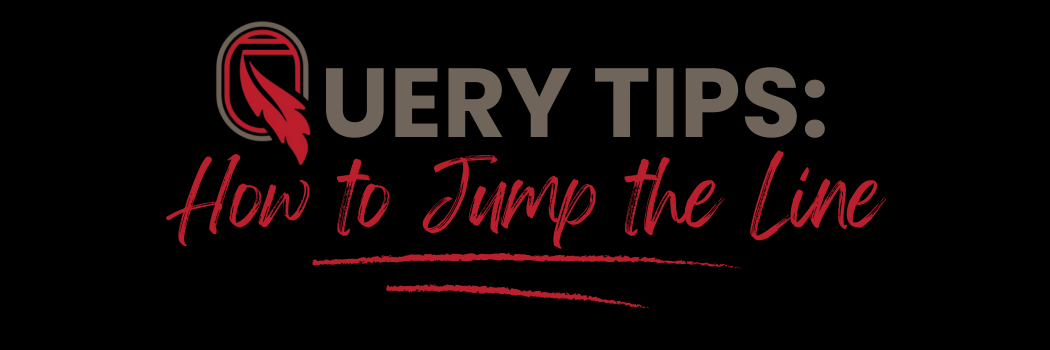January Newsletter
How to Jump the Querying Queue
When I started querying, I mistakenly headed into the process believing that submission package was on par with everyone else’s. In other words, I believed that if 49,999 other people were querying the same agents alongside me, I logically must have had a one-in-50,000 chance of landing an agent or getting a book deal.
That math is wrong. It assumes that every author is equal in the eyes of agents, and they are not.
There are things you can do to drastically improve your odds of skipping ahead in the querying queue. Do not assume that you have the same odds of success as everyone else. Your odds can (and should) be better than most people’s.
The following three things sound simple, but they’re enough to make you more impressive than a huge swath of your competition:
Proofreading - When it comes to grammar, mechanics, and syntax, you would be stunned at how many people are submitting less than pristine query letters. Because of this, if you’ve got a squeaky clean query letter, you will have jumped a quarter to a third of other querying authors right out of the gate. Perhaps you are wondering, “Why wouldn’t someone properly proofread their query letter? It is basically a job application to be a professional writer!” I, too, wonder this. But don’t wonder too much, friends. Just proofread the hell out of that query letter and leave the lazy proofreaders in your dust.
Brevity - Remember those huge Literature textbooks in high school that packed like 6,000 words onto a single page? Do you remember how soul-crushing it was to bump into a page with no pictures, no dialogue, and very few paragraph breaks? That’s how agents feel when they open a too-long query letter. If you can get your query letter under 350 words (or even 300, ideally), you are giving yourself an easy advantage. Not only are you proving that you can write concisely, but you’re also proving that you value the agent’s time. I’d estimate that 75% or more of the queries I read start at over 450 words. Writers that can assemble short, punchy pitches are immediately impressive. All you’ve got to do is cut ~100 words to get there! (HOW you go about doing that is a conversation for another day!)
Uniqueness - A lot (and I mean a LOT) of query letters pitch story concepts that are too similar to stories that already exist. That’s not necessarily a bad thing in certain genres, but it’s easier for literary agents to sell unique books than it is derivative or cliche books. If you really want to skip the line, having a concept that is either entirely unique or a new twist on something familiar is a great way to do it. I know you can’t go back and change an entire story after the fact, but you can highlight what makes your book unique and special. I’ve said this a million times, but in a query letter, you want to SELL your story, not TELL your story. Don’t worry about doing your plot justice (that’s what the synopsis document is for); worry about highlighting why your book isn’t like all the other girls.
As someone who has read hundreds and hundreds of query letters this year, the very best manage to do all three of these things. Standout queries involve a punchy, unique concept, are brief and concentrated, and are free of any grammatical, spelling, capitalization, or punctuation errors. It’s truly as simple as that.
You may not be able to control whether an agent passes or offers representation, but you can control the factors that get you the best possible seat at the table. All three of the aforementioned items are in your control, so control them as a means of jumping ahead of all those querying writers who don’t know better.
January is Query Month!
Because so many authors are excited about agents opening back up this month, I’ve decided to make the month of January all about Query Education. Every day on Twitter (and probably Bluesky and maybe also Threads), I’ll post about a new querying topic. If you’re not following me at one or more of those places yet, get on that (please and thank you):
I’m also considering running a promotion on query letters in January, but I haven’t decided what that’s going to be yet. That’ll be something I announce on social media once I get it straightened out. All the more reason to follow me there!
Talkin’ Tropes
I recently read The Trope Thesaurus, by Jennifer Hilt hoping it would be similar to The Emotional Wound Thesaurus, which is one of the best writing books that I own. Unfortunately, The Trope Thesaurus did not live up to my lofty expectations, so I did what I probably should’ve done in the first place: I googled the information on tropes I was looking for when purchasing the book.
So here’s a fantastic (and free) list of tropes. Tropes can help or hurt your book, depending on how you use them, but before I get into all of that, I probably should refresh your memories as to what a trope is.
Tropes are story elements that consistently show up in certain genres and mediums. Take, for example, Hallmark Christmas movies, the tropiest of tropey story types. These stories almost always feature someone from the big city finding their way to a small-town bakery or flower shop where they relearn the magic of Christmas. Characters often must choose between work and love, their children and elders meddle to push forward the romance, and there are snowball fights, gingerbread house-making contests, and winter wardrobes brought to you by the J.Crew Christmas catalog.

On the one hand, tropes can create familiarity for their readers. People watching Hallmark Christmas romances expect a certain cadence to the story, and they’re watching in part to catch glimpses of all their favorite Greatest Hits. There is comfort and joy in predictability, and during the holidays, we’re all looking for a big, healthy dose of comfort and joy.
On the other hand, tropes can be cliche and bore the Christmas cookie crumbs out of viewers. If the whole story is just tropes with no variation or derivation, it’s not going to be a story that sells.
So how do we make the most of tropes? Here’s how I use them:
What do readers expect?
There is familiarity in using tropes, not only in terms of pacing a story but also in giving readers the story elements that they’re looking for. Many fantasy readers, for example, expect there to be a Chosen One protagonist, a quest, and a system of magic. Not giving your readers those things would be like Carly Rae Jepsen refusing to perform “Call Me Maybe” at one of her concerts. Our readers are happy when we give them what they want, and oftentimes what they want are their favorite genre-specific tropes.
There is no such thing as a romance novel that doesn’t end with either Happily Ever After or Happy For Now. If the two love interests don’t end up together, it’s not a romance. Certain tropes are expected and necessary!How can I subvert those expectations or put a new twist on something familiar?
That’s the trick, isn’t it? If a reader has certain expectations, then we can anticipate what they expect and screw with them to maximize engagement and create something that feels new, unique, and fresh. Think about George R.R. Martin killing off Ned Stark early in Book One of A Song of Ice and Fire, or in Gone Girl when Amy Dunne turns out to be a master manipulator and antagonist instead of a victimized “perfect” wife. Work within the system just enough, but mess around with the system, too!
Imagine settling into that fantasy book with a Chosen One prophecy. The readers are thinking, “Ah, yes. This old chestnut.” But halfway through the book we learn that the prophecy was a forgery, and that our protagonist is not the Chosen One after all. That’s a subversion of a trope (and honestly, something I’d be excited to read).
To know and understand tropes is to know and understand your genre and your audience. By excluding important ones (or writing them incorrectly), you can come off as a rube or an outsider. Conversely, if you can nail them and/or tinker with them in just the right way, you’ll have readers literally eating out of the palm of your hand.
What I’m Reading
I don’t know why I set a Goodreads challenge for myself every year because it just becomes one more thing I must scramble to accomplish during the busiest month of the year. I set a goal of 75 books in 2024 and ended up at 70 with only a couple weeks left in December, so I made myself read a ton of quick-hitters to get to 75.
This was especially dumb for a couple of reasons:
There were six books in my “Read” pile with blank “finished” dates, which means I had read them, but Goodreads just wasn’t counting them toward my total.
I read and worked on just shy of 30 full manuscripts this year, which “don’t count” because unpublished manuscripts obviously are not on Goodreads. Did I read 75 books this year? No. I read well over a hundred. But like steps without a Fitbit, they don’t count unless an app tracks them (I guess. I wish I wasn’t this way, but I am).
In any event, I read a crapton of shorter books this month, which was fine but not as enjoyable or thorough as I normally prefer to read things. So instead of breaking down what I read in December, here’s my top ten favorite books from my 2024 Goodreads pile:
#10 - Colton Gentry’s Third Act, by Jeff Zentner
#9 - Chain Gang All-Stars, by Nana Kwame Adjei-Brenyah
#8 - The Warmth of Other Suns, by Isabel Wilkerson
#7 - I’m Glad My Mom Died, by Jennette McCurdy
#6 - The Door of No Return, by Kwame Alexander
#5 - A Storm of Infinite Beauty, by Julianne MacLean
#4 - The Revenge of the Tipping Point, by Malcolm Gladwell
#3 - Starter Villain, by John Scalzi
#2 - The Heart’s Invisible Furies, by John Boyne
#1 - James, by Percival Everett
If you haven’t read James yet, I strongly (STRONGLY) suggest that you do. Few books are both literary and badass, and even fewer are deeply literary and staggeringly badass.
Starter Villain was the funniest book I read all year, and Revenge of the Tipping Point was far and away the best audiobook experience of the year. As for The Heart’s Invisible Furies, it wins the aware for filling the Ken Follett sized hole in my heart in a year when there was no new Ken Follett book for me devour.
All great stuff, and I hope you all had a great year of reading (and writing!), too.
That’s it for 2024. On to bigger and better things in 2025!
Hugs and high fives,
-JB






